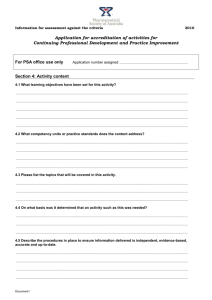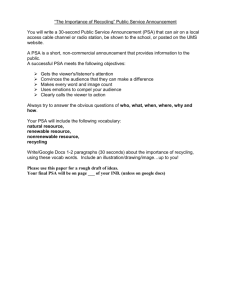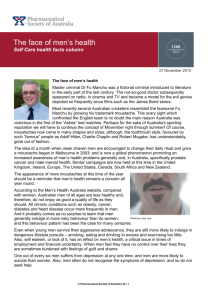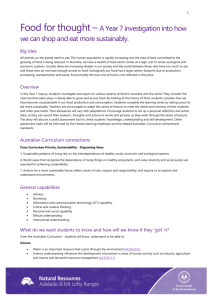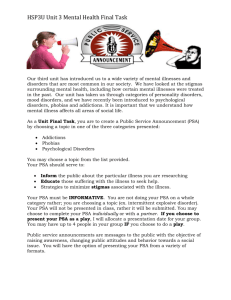No. 1309 http://www.psa.org.au/selfcare Maintaining men in a
advertisement
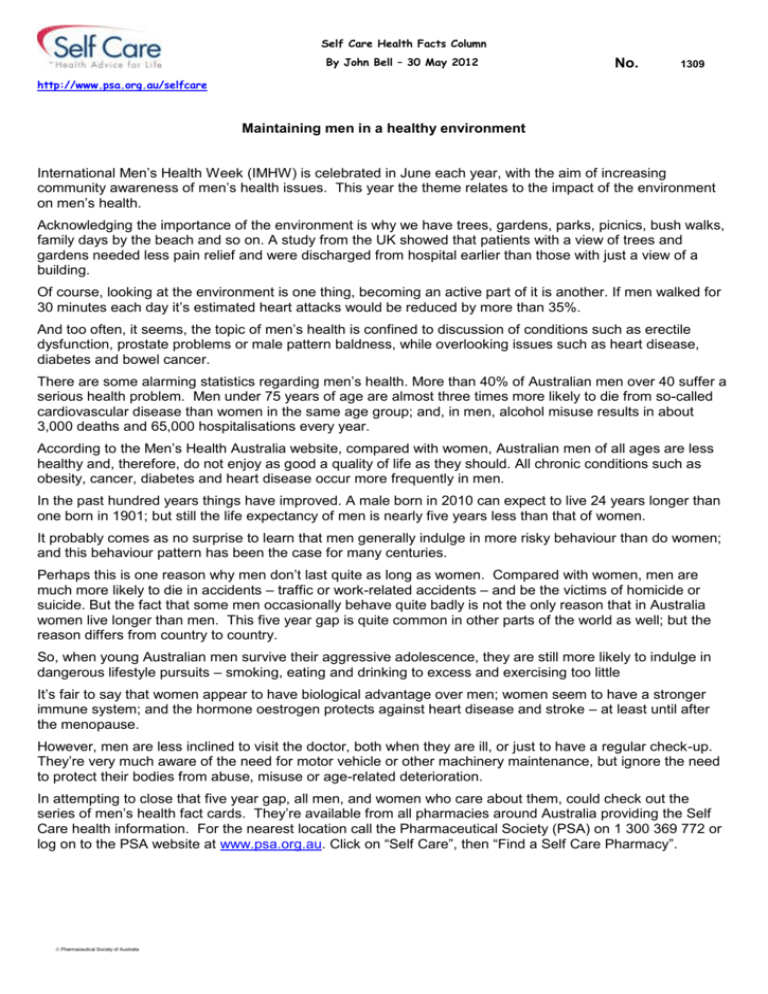
Self Care Health Facts Column By John Bell – 30 May 2012 No. 1309 http://www.psa.org.au/selfcare Maintaining men in a healthy environment International Men’s Health Week (IMHW) is celebrated in June each year, with the aim of increasing community awareness of men’s health issues. This year the theme relates to the impact of the environment on men’s health. Acknowledging the importance of the environment is why we have trees, gardens, parks, picnics, bush walks, family days by the beach and so on. A study from the UK showed that patients with a view of trees and gardens needed less pain relief and were discharged from hospital earlier than those with just a view of a building. Of course, looking at the environment is one thing, becoming an active part of it is another. If men walked for 30 minutes each day it’s estimated heart attacks would be reduced by more than 35%. And too often, it seems, the topic of men’s health is confined to discussion of conditions such as erectile dysfunction, prostate problems or male pattern baldness, while overlooking issues such as heart disease, diabetes and bowel cancer. There are some alarming statistics regarding men’s health. More than 40% of Australian men over 40 suffer a serious health problem. Men under 75 years of age are almost three times more likely to die from so-called cardiovascular disease than women in the same age group; and, in men, alcohol misuse results in about 3,000 deaths and 65,000 hospitalisations every year. According to the Men’s Health Australia website, compared with women, Australian men of all ages are less healthy and, therefore, do not enjoy as good a quality of life as they should. All chronic conditions such as obesity, cancer, diabetes and heart disease occur more frequently in men. In the past hundred years things have improved. A male born in 2010 can expect to live 24 years longer than one born in 1901; but still the life expectancy of men is nearly five years less than that of women. It probably comes as no surprise to learn that men generally indulge in more risky behaviour than do women; and this behaviour pattern has been the case for many centuries. Perhaps this is one reason why men don’t last quite as long as women. Compared with women, men are much more likely to die in accidents – traffic or work-related accidents – and be the victims of homicide or suicide. But the fact that some men occasionally behave quite badly is not the only reason that in Australia women live longer than men. This five year gap is quite common in other parts of the world as well; but the reason differs from country to country. So, when young Australian men survive their aggressive adolescence, they are still more likely to indulge in dangerous lifestyle pursuits – smoking, eating and drinking to excess and exercising too little It’s fair to say that women appear to have biological advantage over men; women seem to have a stronger immune system; and the hormone oestrogen protects against heart disease and stroke – at least until after the menopause. However, men are less inclined to visit the doctor, both when they are ill, or just to have a regular check-up. They’re very much aware of the need for motor vehicle or other machinery maintenance, but ignore the need to protect their bodies from abuse, misuse or age-related deterioration. In attempting to close that five year gap, all men, and women who care about them, could check out the series of men’s health fact cards. They’re available from all pharmacies around Australia providing the Self Care health information. For the nearest location call the Pharmaceutical Society (PSA) on 1 300 369 772 or log on to the PSA website at www.psa.org.au. Click on “Self Care”, then “Find a Self Care Pharmacy”. Pharmaceutical Society of Australia
